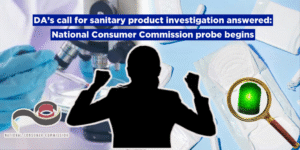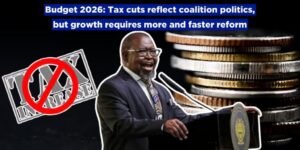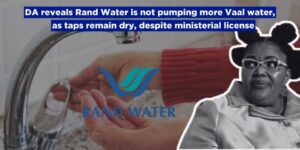“My mom is 85 and has colorectal cancer. My mom is using diapers and without water, it is a real disaster. This is a human rights violation. Our municipal account is 100% up to date. Why are we being treated this way?” These were the painful words of one Johannesburg resident who, like many others across the city, has had to endure weeks without a steady water supply.
The tragedy for residents is that, as the water crisis worsens with each passing day, they have been forced to rely on themselves and each other because of the lack of decisive leadership from Johannesburg City Hall. In what stands out as one of the lowest points in this crisis, the Mayor, Kabelo Gwamanda, who is clearly out of his depth, has flatly denied that there is a water crisis in the City. Gwamanda has never taken any responsibility for the crisis at any point in this crisis.
While infuriating, Gwamanda’s indifference to the plight of residents is not surprising. The ANC/EFF doomsday coalition that hoisted him up to the Mayors’ office should carry equal blame for the unfolding water crisis. The City’s mayoral committee are either nowhere to be found or have simply given up trying to find solutions for the water crisis.
While residents want the water supply restored as quickly as possible, the MMC for environment & infrastructure, Jack Sekwaila, appearing in a press conference together with Gwamanda, released a 10-year infrastructure plan that will only be tabled in council at the end of May. This is hardly any consolation to residents who are forced to stand in daily queues to collect water from boreholes and water trucks.
The extent of the leadership crisis is best captured by the piecemeal interventions made to provide short-term relief to residents desperate for water. For a population of almost 6 million people, Johannesburg only has 35 water tankers. This averages to about one tanker per 171 429 residents, which is wholly inadequate and can only meet the water needs of a small fraction of the City’s households.
The only sustainable solution to the water crisis is to address the infrastructure failures that have contributed to the current water outages. Unfortunately, the budget for infrastructure maintenance is woefully inadequate, and Johannesburg is currently saddled with an R80 billion water infrastructure backlog.
According to an NGO called WaterCan, ‘there has been a consistent lack of funding allocated to maintenance… the repairs and maintenance budget goes to personnel and only a tiny amount for inventory…with only about 13% of the City’s capital expenditure budget covering both building new assets and renewal of existing assets’. Therefore, it is no surprise that the City loses 46.1% of the water it receives from Rand Water due to leaks and incurs R1.7 billion in lost revenue as a result.
Former DA Mayor, Mpho Phalatse, had embarked on a programme to work with the private sector to address the mammoth infrastructure backlog in Johannesburg, but all indications are that the current ANC/EFF coalition has abandoned the programme.
In a crisis of this nature that has upended people’s lives and brought untold suffering, the last thing you need is a political and administrative system that is constantly on the back foot. Yet that is precisely the hand that the poor residents of Johannesburg have been dealt under the ANC/EFF doomsday coalition. Contrast their response to the proactive approach taken by the DA-led City of Cape Town in 2018 when it was faced with the prospect of a ‘Day Zero’, a reference to when taps were expected to run dry. At the time, the City of Cape Town administration partnered with residents to achieve a successful water conservation regime that averted a crisis and won international acclaim. Since then, a sustained programme of investment in water infrastructure has led to a significant reduction in water losses and leaks.
In February 2024, Mayor Geordin Hill-Lewis announced the City would be spending R43 billion on infrastructure over the next three years – a spending rate far outpacing any other metro and more than Johannesburg and Durban combined. Commitment to infrastructure investment and maintenance has seen Cape Town saving 3,73 million cubic metres of water annually, which equates to savings worth more than R31 million
The same cannot be said about the response that has so far been exhibited by the ANC/EFF doomsday coalition on the water crisis. Saddled with a 1% Mayor who is afraid to lead, the coalition has proven that it is simply incapable of leading Johannesburg out of crisis. Blame-shifting and half-baked interventions have combined to make the crisis worse. Early this month, Johannesburg residents took to the streets to protest against the water crisis. On 29 May, their anger and frustration will be loud and clear at the ballot box.




